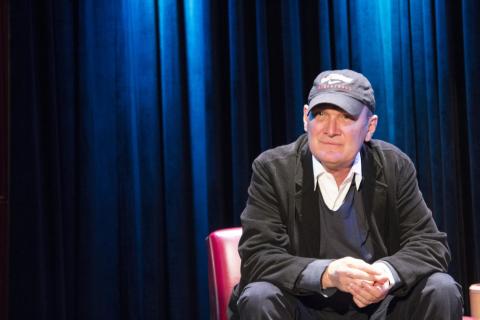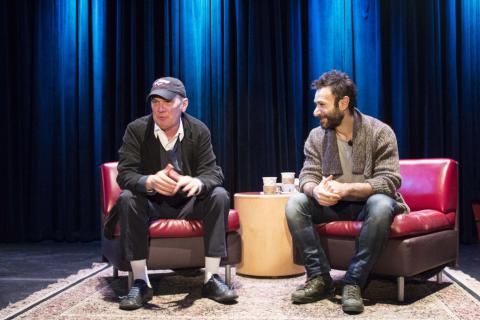BerkleeICE Series: Bertis Downs Talks About R.E.M.'s Path to Success

Bertis Downs
Photo by Georgy Abshilava

Bertis Downs and Panos Panay
Photo by Georgy Abshilava
Seated in front of a full house at Cafe 939 recently, Bertis Downs recounted his career as the manager of indie rock icons R.E.M. and advised students not to follow his path.
“It’s a really, really unusual, unlikely one, especially today,” Downs said at a Creative Entrepreneurship Lecture series talk hosted by BerkleeICE and its founding managing director, Panos Panay. “Hooking your star to a wagon and expecting that to be the right one—I mean, I didn’t expect it—and it was pretty unlikely then.”
That wagon, of course, turned out to be one of the most successful bands of the 1990s, pioneers in bringing alternative music to the mainstream, influencing tastemakers along its long trail from Athens, Georgia, to stadiums around the world.
This was a time before what people used to call the information superhighway came along, and the music industry shifted into fifth gear. R.E.M. enjoyed the last stretch of recording history in which it was possible to put out seven studio albums before having a hit, as they did from their inception in 1981 to the release of “Losing My Religion” in 1991.
“They were super-driven to be good,” Downs said, but they were never in a hurry. “They didn’t have big expectations and were happy to just try to get better and better at what they did.”
Downs met the band while he was a law student at the University of Georgia and the four members of what would become R.E.M. were undergrads. What turned into a career managing the band until its dissolution in 2011 began as giving advice to buddies he met in school and around town.
And though R.E.M. transformed from college band to industry machine, Downs’s function remained the same at its core: “My role with the band was always pretty much to try to help take and translate what they want to do artistically and make that make sense commercially.”
Today, Downs and Panay agreed, the landscape of the music industry has changed dramatically from R.E.M.’s day, and musicians usually have to take on some of the commercial duties. They need to be marketers, entrepreneurs, social media managers, blog writers, and more.
“There are just so many more variables; it’s so much more complicated,” Downs said. “But the fact is, [musicians] are doing it. There are people making this work now in more creative ways. I think you probably have to work harder at it.”
Though he cautioned students against following his path, Downs left them with directions as they make their own inroads into the industry: Stay open-minded, curious, and turn negatives into positives. Return calls and email. Develop good business practices (like paying taxes). And, above all, do what you care about.
Browse BerkleeICE events for a list of future and upcoming lectures in the series. All lectures are open to the public.
